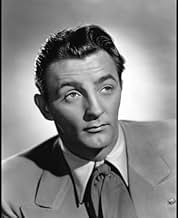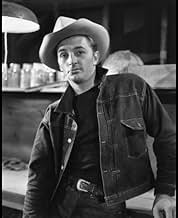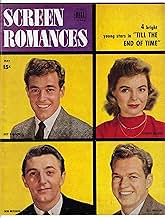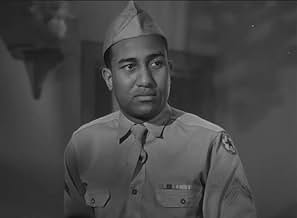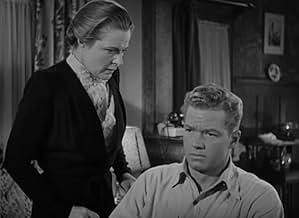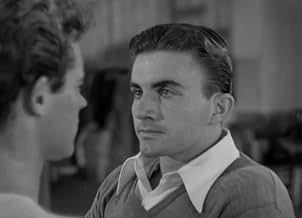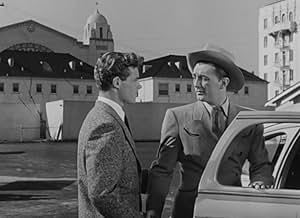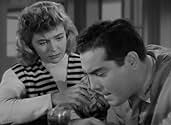CALIFICACIÓN DE IMDb
6.7/10
1.7 k
TU CALIFICACIÓN
Drama sobre viejos marines de la Segunda Guerra Mundial que se reajustan a la vida civil y se enfrentan a sus traumas mentales y físicos.Drama sobre viejos marines de la Segunda Guerra Mundial que se reajustan a la vida civil y se enfrentan a sus traumas mentales y físicos.Drama sobre viejos marines de la Segunda Guerra Mundial que se reajustan a la vida civil y se enfrentan a sus traumas mentales y físicos.
- Dirección
- Guionistas
- Elenco
- Premios
- 4 premios ganados en total
Harry von Zell
- Scuffy
- (as Harry Von Zell)
John Bailey
- Interviewer
- (sin créditos)
Bobby Barber
- Arcade Game Player in Saloon
- (sin créditos)
Bill Barnum
- Jackson
- (sin créditos)
Dick Benjamin
- Sergeant
- (sin créditos)
Paul Birch
- Marine Wanting Farm
- (sin créditos)
- Dirección
- Guionistas
- Todo el elenco y el equipo
- Producción, taquilla y más en IMDbPro
Opiniones destacadas
Dorothy McGuire's performance (as Pat Ruscomb, war widow) is exceptionally good in this film. She is so convincing that viewers need focus on the effects of World War II on the war widows as much as the effects on returning servicemen. Despite her plight, she is the character that holds the film together when all else is chaos. One can only wonder how many women were left in like situations after the war. Where "The Best Years of Our Lives" adequately portrays the problems of readjustments of soldiers to civilian life, this film gives us a look at the sinister effect on those who remained on the home front. The scars on women, families, and homes do extend "till the end of time."
After seeing the book Heartthrobs in the bookstore I was dying to see the beautiful man on the cover actually moving and speaking. Guy Madison is absolutely the most beautiful person that I have ever seen, male or female. Looking at him is truly like staring at a piece of art. It's no wonder some casting director thought to himself "the world needs to see this man 30 feet high" - the camera cannot seem to catch this guy at a bad angle. Guy is not the best actor you'll come across, but he is charming and earnest and hey his co-stars are Robert Mitchum and Dorothy McGuire so check it out! Dorothy's a fine actress, but a little matronly in this one - she's seems more like Guy's mother than a suitable love interest. If only they'd given her better ensembles - there's one scene with her in slip and much to my surprise she had a lovely little figure hiding under those awful jackets.
No need to repeat the plot. That scene where Pat (McGuire) and Cliff (Madison) encounter the shell-shocked outpatient is genuinely disturbing. For a screenplay, that's a tough problem to treat in a single set-up. Pat's little anecdotal lesson works pretty well-- the soldier is relieved of his demons for the moment. But for how long, I wonder. And what will become of him, sitting alone, quaking, and afraid to go home. And how many others will come home like him. The script says the inner wounds will wear off eventually, but then it had to say something like that, otherwise the movie's hopeful tone would be compromised. And that would be counter to what the country needs following four years of horror.
It' a decent, earnest movie, produced by the studio's (RKO) head honcho Dore Schary, so it's a prestige production. Looks like they took a gamble on an unknown Guy Madison in the lead role. He certainly looks the part—I can just about hear the echoing squeals of bobby- soxers even 60 years later. He does bring an earnestness that's refreshing, even if his range is pretty limited as the heavier scenes show. Newcomers Mitchum and the underrated Bill Williams also register, along with the dewy-eyed Dorothy McGuire before she became a favorite movie mom. But I especially like Jean Porter's vivacious teenager. It's really her Helen who projects the buoyant spirit of the coming consumer age.
There were, of course, a number of these "adjustment" films as the country struggled with a return to normalcy. Where this movie excels is with the uncertainty of a recovering civilian world. Each main character is drifting as a result of the war. Each has been changed and must now work out how to fit back in. Then too, I like the rather ambivalent way the movie ends, avoiding easy solutions.
There's one other sequence worth noting. The barroom brawl is both over-done and clumsily staged. Nonetheless, it makes an important point. Namely, that the war has changed society as well as individuals. A post-war America will be more inclusive than the traditional America. The logic appears to be that since it took everyone to win the war, no one should be excluded from the fruits. Given the civil rights movement soon to emerge, the movie thus proves prophetic. Too bad this worthy movie effort now seems so obscure. Despite the years, it remains an affecting look at a key period in American life and merits catching up with.
(In passing—that's filmmaker Blake Edwards of Pink Panther fame as the shop foreman that Cliff tangles with, soon to become a screenwriter, and then an A-picture producer-director.)
It' a decent, earnest movie, produced by the studio's (RKO) head honcho Dore Schary, so it's a prestige production. Looks like they took a gamble on an unknown Guy Madison in the lead role. He certainly looks the part—I can just about hear the echoing squeals of bobby- soxers even 60 years later. He does bring an earnestness that's refreshing, even if his range is pretty limited as the heavier scenes show. Newcomers Mitchum and the underrated Bill Williams also register, along with the dewy-eyed Dorothy McGuire before she became a favorite movie mom. But I especially like Jean Porter's vivacious teenager. It's really her Helen who projects the buoyant spirit of the coming consumer age.
There were, of course, a number of these "adjustment" films as the country struggled with a return to normalcy. Where this movie excels is with the uncertainty of a recovering civilian world. Each main character is drifting as a result of the war. Each has been changed and must now work out how to fit back in. Then too, I like the rather ambivalent way the movie ends, avoiding easy solutions.
There's one other sequence worth noting. The barroom brawl is both over-done and clumsily staged. Nonetheless, it makes an important point. Namely, that the war has changed society as well as individuals. A post-war America will be more inclusive than the traditional America. The logic appears to be that since it took everyone to win the war, no one should be excluded from the fruits. Given the civil rights movement soon to emerge, the movie thus proves prophetic. Too bad this worthy movie effort now seems so obscure. Despite the years, it remains an affecting look at a key period in American life and merits catching up with.
(In passing—that's filmmaker Blake Edwards of Pink Panther fame as the shop foreman that Cliff tangles with, soon to become a screenwriter, and then an A-picture producer-director.)
Some jerk movie reviewer says it was to much of a tear jerker. What does he or she know. I , being a Vietnam combat vet, remember seeing the movie some years ago on TV and thinking how much I related to the story line. I can't remember much about the movie except for the fact that the filmmaker was right on when it came to trying to readjust. It ain't easy. Lots of resentment and hostility. The story may have tugged at the heart but film making has got to deal with the emotional side of ones story as well as the artful aspects of making a film. The reviewer obviously has spent no time in combat so as a result the main theme of the story escapes him or her. FIGURES
I would make the case that Guy Madison may be the best-looking young man to ever star in a feature film, and this is his best one. There are moments where his totally unselfconscious looks are just jaw-dropping. His acting, on the other hand, can be described charitably as "natural"; but I wasn't expecting Lawrence Olivier. Guy was an early find of legendary Hollywood agent Henry Willson, who would later "discover" a tall young man whom he renamed Rock Hudson.
¿Sabías que…?
- TriviaJean Porter and Edward Dmytryk met during the making of this film and would be married in 1948, until his death in 1999.
- ErroresOn the bus arriving at the Marine base at the beginning, California is misspelled "Caliornia."
- Citas
Cliff Harper: We parted company when he was dumb enough to get shot!
William Tabeshaw: Why don't you own up,Harper? I was a big hero and you were a coward!
- ConexionesFeatured in Hollywood the Golden Years: The RKO Story: Dark Victory (1987)
- Bandas sonorasTill the End of Time
by Buddy Kaye and Ted Mossman, based on Chopin's "Polonaise"
Music by Frédéric Chopin (uncredited)
Selecciones populares
Inicia sesión para calificar y agrega a la lista de videos para obtener recomendaciones personalizadas
Everything New on HBO Max in August
Everything New on HBO Max in August
Looking for something different to add to your Watchlist? Take a peek at what movies and TV shows are coming to HBO Max this month.
- How long is Till the End of Time?Con tecnología de Alexa
Detalles
- Fecha de lanzamiento
- País de origen
- Idioma
- También se conoce como
- Till the End of Time
- Locaciones de filmación
- Productoras
- Ver más créditos de la compañía en IMDbPro
- Tiempo de ejecución1 hora 45 minutos
- Color
- Relación de aspecto
- 1.37 : 1
Contribuir a esta página
Sugiere una edición o agrega el contenido que falta

